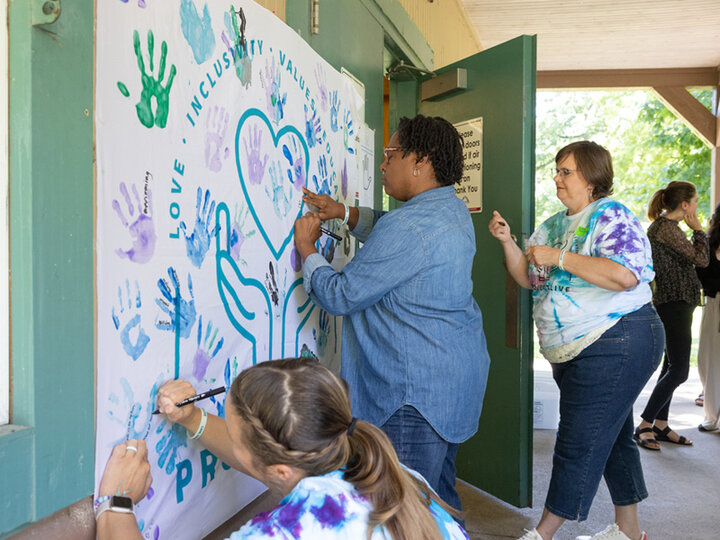Project LIVE (Love, Inclusivity, Values, Education)
Using a five-year grant from the Centers for Disease Control and Prevention (CDC), researchers and community partners will collaborate to deliver the READY to Stand Curriculum™ to high school students and school personnel in Des Moines, Iowa. The project aims to prevent sex trafficking in Des Moines Public Schools (DMPS). This will be achieved, in part, by increasing students’ skills for healthy relationships, and by helping students identify personal safeguards to enable them to act if they feel unsafe. The curriculum, developed by The Set Me Free Project™, will be implemented in two Des Moines high schools beginning in 2023, and will later expand to reach students in six additional high schools.

Participant Resources
Resources are available for students, school personnel and parents/guardians who are participating in the project, including various forms, handouts and information sheets on organizations that offer support.
View Resources
Advisory Board
The project will be informed by an advisory board comprised of students, caregivers, school personnel and community members with relevant professional expertise. If you are interested in joining the board, please contact Dr. Katie Edwards.

Interested?
For more information about the project and participation opportunities, please contact:
Katie Edwards, Ph.D.
Professor, Educational Psychology
Principal Investigator

Study Details
Curriculum
The READY to Stand Curriculum™ was developed by The Set Me Free Project™ — a Nebraska-based nonprofit organization that provides human trafficking prevention education to youth and families.
- The curriculum provides information on healthy relationships, safe people and resources, valuing self and others, social media safety and shifting school culture to be intolerant of all forms of violence.
- The curriculum is used in about 400 schools across Iowa, Nebraska and South Dakota.
- Despite its potential for reducing sex trafficking among youth, the READY to Stand Curriculum™ has not been formally evaluated.
Timeline
YEAR 1: Plan & Coordinate Research
- Create Research Advisory Board (including youth, caregivers and school personnel) to guide the project.
- Collect data to refine the curriculum and research protocols (e.g., surveys).
YEAR 2: Test Curriculum Delivery
- Deliver curriculum to students and school personnel in two (of the eight) Des Moines high schools.
- Collect data to determine value of surveys and ways to improve curriculum delivery.
YEARS 3-5: Program Delivery & Evaluation
- Deliver curriculum to three high schools; students complete surveys before and after receiving program.
- Remaining three high schools receive program after final survey.
YEARS 5+: Share Findings
- Disseminate findings broadly to local and national audiences.
- Sustain the program in DMPS, if desired.
Components
1. Curriculum
- The READY to Stand Curriculum™ is delivered to students through a series of six 45-minute modules that use age-appropriate videos and group discussions by trained adult program educators.
- School personnel receive a 90-minute module focused on effectively managing youth disclosures and rejecting all forms of violence, including sexual exploitation of children.
2. Research
- To ensure its success, this project uses a community–school led participatory action research approach which involves members of the community and school in all phases of the research.
The research component of this project involves collecting information from students and school personnel to help determine whether, and to what extent, the curriculum is effective in meeting intended outcomes, including:
Increased:- Knowledge about sex trafficking.
- Valuing of self and others.
- Healthy relationship skills.
- Prevention conversations with school personnel.
- Bystander behavior to prevent sex trafficking.
Decreased:
- Sex trafficking victimization and perpetration.
- Teen dating violence victimization and perpetration.
- Sexual violence victimization and perpetration.
Collaborators
Des Moines Public Schools and The Set Me Free Project™ have a long history together and an agreement to deliver the curriculum to all students in the district. The University of Nebraska–Lincoln (UNL) was invited to formally evaluate the curriculum and secure funding for curriculum delivery.
- UNL researchers
- The Set Me Free Project™ staff
- DMPS school and district personnel
"This work between DMPS and the University of Nebraska will provide an important look at how schools can make a difference in addressing a critical issue – sex trafficking – and help us do more to make sure our students are safe, whether in or out of the classroom."
-Matt Smith, interim superintendent, Des Moines Public Schools
"One of the foundations of our curriculum is that each person has an intrinsic value that no one can take away. One goal is to see that students walk away with an understanding of their worth and value. That changes the entire dynamic of just learning topics, but also feeling differently about who they are."
-Stephanie Olson, founder, The Set Me Free Project™
"We want to determine whether a program is working, which pieces are working and for whom it is working. From there, we’ll figure out how the curriculum could be tailored for other communities."
-Rochelle Dalla, professor of child, youth and family studies, University of Nebraska–Lincoln
"The more awareness there is about human trafficking, the better chance we have to prevent it. If we are able to get some solid information on how to prevent perpetration, we could be saving lives. That would be priceless."
-Kim Brady, development coordinator, READY to Stand Curriculum™